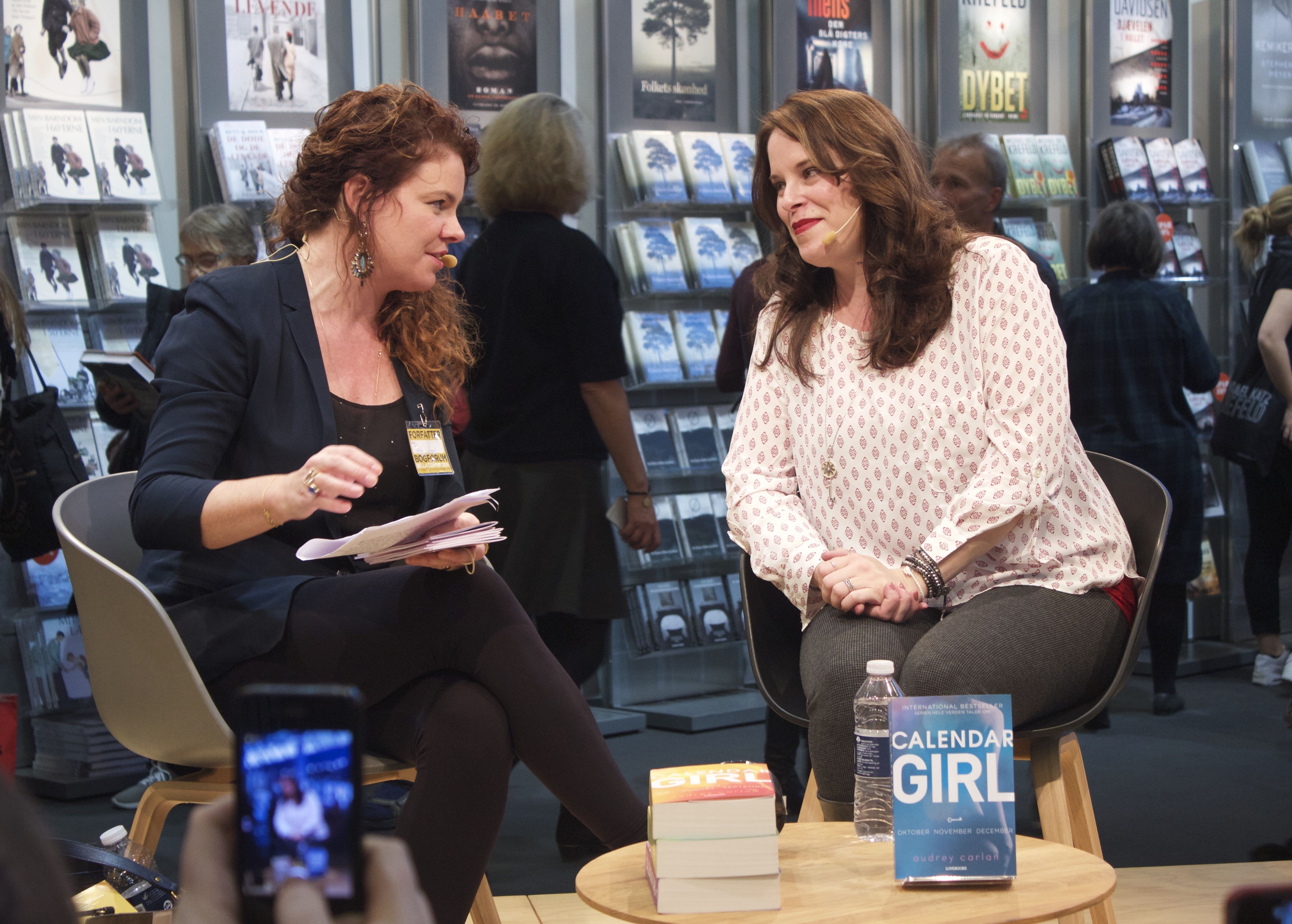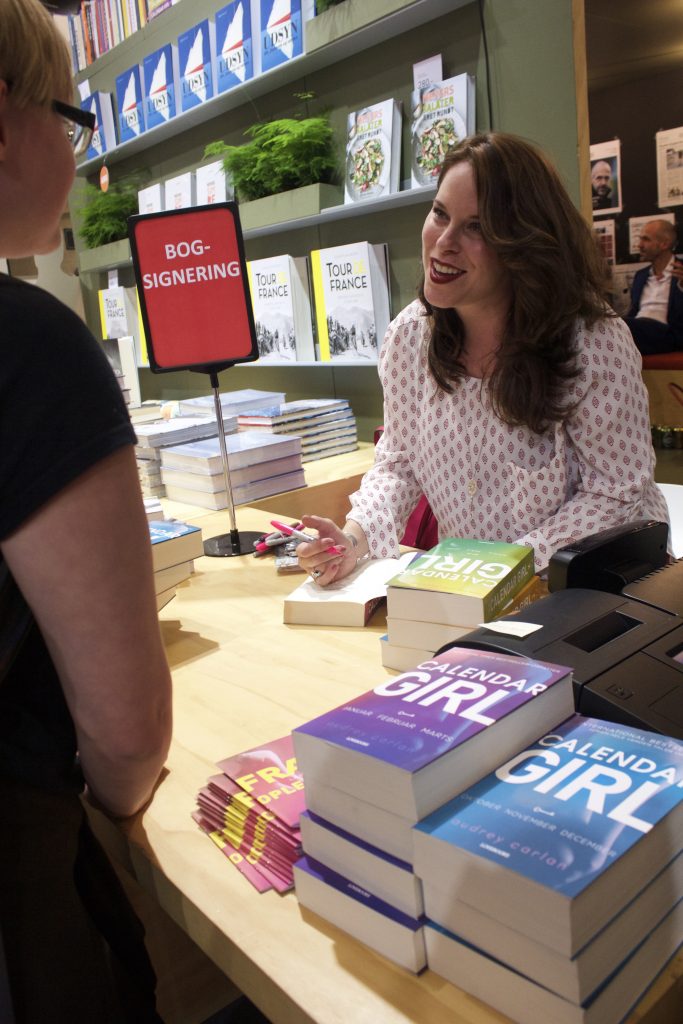In Denmark people are quite open about sex, nakedness and even porn.
We see big companies like VisitDenmark and Spies continuously promoting themselves with ads about sex, and it’s a well known fact that Denmark was the first country to legalise porn back in 1969.
READ MORE: It’s longevity that matters, not length, claims Danish travel agency’s latest fruity ad
When you take all this into account, Denmark should be the perfect country to promote a bit of erotic romance.
Meeting Audrey Carlan
So, hold your horses, there’s a new girl in town. Literally.
In the erotic romance series, ‘Calendar Girl’ protagonist Mia Saunders takes a job as a high-priced escort to pay off her father’s debt. The premise is simple: over the course of a year she will spend each month in a new city with a new man, and sex is only included if she decides it.
READ MORE: Erotic, but not as exciting international line-up at Denmark’s leading book festival
CPH POST met up with author Audrey Carlan at the Copenhagen Book Forum to talk about sex, porn and erotic romance, and of course her impressions of sexually-liberated Denmark.
What do you think of the terms ‘soft porn’ and ‘mommy porn’ that are often used in connection with your genre?
I absolutely despise it. First of all I don’t think romantic love or erotic love is porn. I think porn is about the release. The story is not about the sex as much as it’s about the journey and also the life lessons that she [Mia] learns. I feel as if they’re categorising it as something to be ashamed of. And I don’t think an erotic romance is something you should be ashamed of. I mean people have sex. This is an age old thing; we’re made that way.
So it’s the ‘porn’ part of the description you despise?
Well, yes. But I don’t even have a problem with pornography. People can do what they want. I mean if they can legalise marijuana in California, which they did, I don’t see why there needs to be restrictions on that [porn]. I just don’t think this type of media suits the term, because it’s not about just getting off. Pornography is about literally getting off, the release, and it’s not a story.
Denmark was the first country in the world to legalise porn, and Danes are known to be quite liberal when it comes to sex and nakedness. Have you experienced any difference to America here?
Well, we went to a square where they had a giant TV screen and they were showing movie trailers with teenagers who were totally naked on the screen, and there are kids running around, and that’s just something you would never see in America. So that was pretty shocking. And my friend Emily was just like: “Wow, the Danish are really free. It’s liberating.” You know, and it is. You don’t make an issue of it, when there doesn’t need to be one. So I thought that was pretty impressive.
Many people have compared your series ‘Calendar Girl’ to EL James’s ’50 Shades of Grey’. What do you think about that?
I love ‘Fifty Shades’. Anytime anyone puts me near the beauty that is that story or that woman, I’m very honoured. I don’t think I’m nearly as amazing as she is, but I think we all have people we fan-girl over and we think are amazing. To me she’s like the top. I connected so completely with her personal story of being a mother working in the corporate world writing these stories on the side, and that’s what I did after I read her series.
The genre seems to be more accepted today. Why do you think that is?
I think it has become more accepted, because of the path authors, like EL James, Ann Rice, Sylvia Day. They have paved the way for all of the authors out there who enjoy this genre. They have made it to where it is more accepting; now you see people reading ’50 Shades’ and they’re not hiding it. You see them reading ‘Calendar Girl’ and they’re not hiding it. It’s just literature, and there’s nothing wrong with it. It’s still romance, it’s still love, it’s still sex. It’s all of those things.
How do you respond to criticism of Mia being an escort?
Mia’s story is 12 different cities, 12 different men – possibly. Even though she’s not paid for her body, she’s paid for her time, and she chooses what to do with her body. I think that’s a very important message that women need to hear. There’s no glamorising of prostitution or anything. A lot of people have preconceived notions of what an escort is. In my world an escort is someone who’s paid for her time, and if she chooses to have sex with someone, she chooses to have sex with them – that’s on her. And she doesn’t have sex with all of them.
Have you experienced different reactions to the story from different countries?
Well yes. It was funny: in Norway, one of their biggest women’s magazines was saying: “You’re glamorising prostitution!” and I was like “Wow, really?” I was shocked by this. And she was like: “Well, don’t you think?” and I was like: “Well if you read only one [month], you might think that.” And she had only read the first, and then it’s different. I also went to Brazil, and I’m a hero there because I’m giving women strength. The Brazilian reader-base is the tackle-hug-you kind, and I went home with a whole suitcase full of gifts.
What have reactions from Danish readers been like?
The Danes like that it’s a story they have never read before. People connected to the girl, and the story. One girl said she had only ever read ’50 Shades’ and thought she wasn’t a fan of the genre. But then a friend said she had to read ‘Calendar Girl’, and then she said: “I’m now a fan, and I want to read more erotic books like yours.”

















